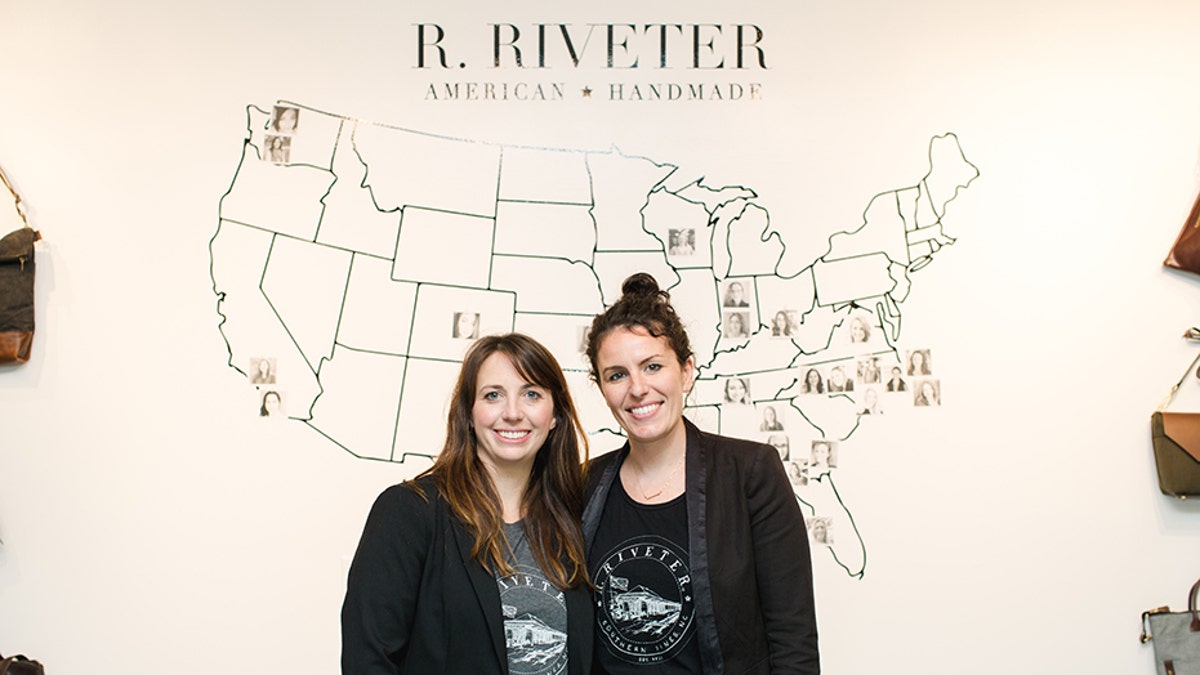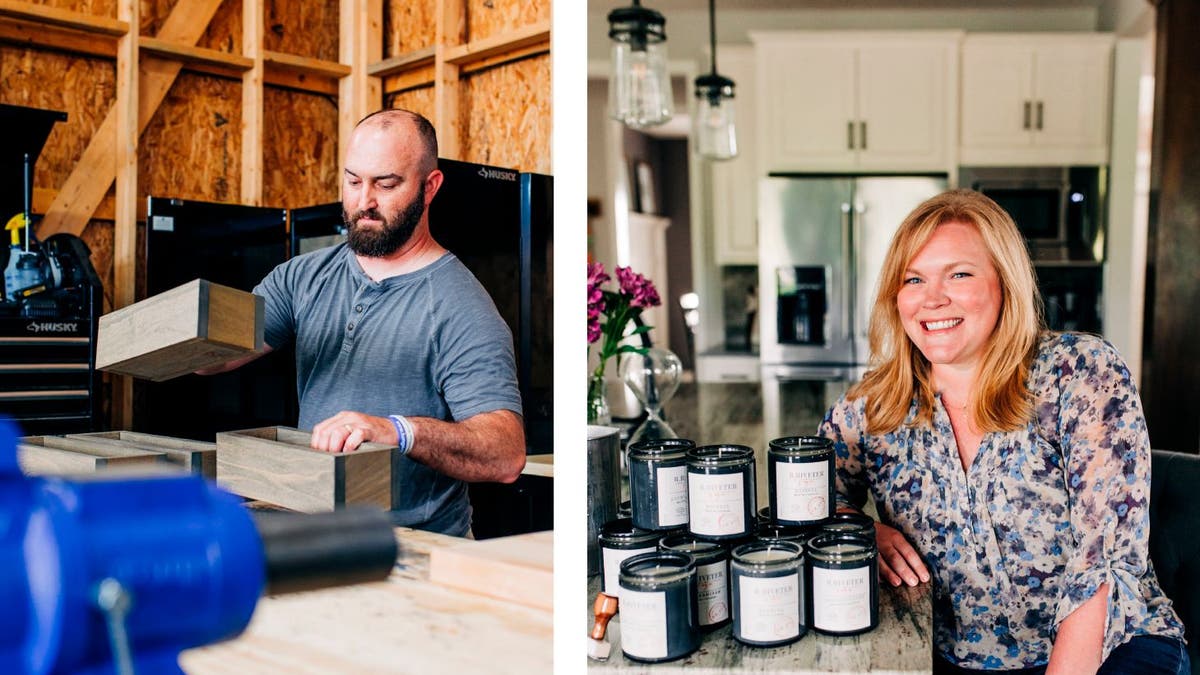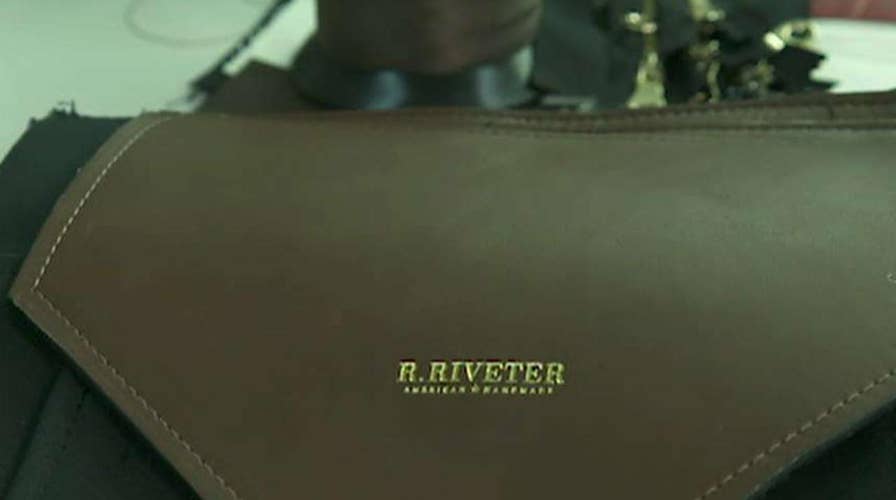Handbag company helps military spouses work from home
Two women have founded a handbag company which is helping to trim the jobless rate of military spouses; host of The Daily Briefing Dana Perino provides the inside scoop.
The COVID-19 pandemic upended the American economy with unprecedented consequences, forcing nonessential small businesses everywhere to shutter their doors, lay off workers and adapt to a new reality: working from home.
But for one small business, the concept of a remote workforce isn’t novel – it’s the lifeblood of the North Carolina-based retail handbag company that, for the last eight years, has employed military spouses living in every corner of the country.
R. Riveter, founded by two women entrepreneurs, isn’t only surviving – it’s thriving – during a time of great economic hardship and job uncertainty in nearly every industry.

The company founded by Lisa Bradley, left, and Cameron Cruse provides remote work opportunities for U.S. military spouses. (R. Riveter)
"Our entire business model revolves around giving remote work to women who need a form of income that is flexible and mobile," said Cameron Cruse, who, along with co-founder Lisa Bradley, started the business in the attic of her home with a single sewing machine in 2011.
"We’ve been doing this all along," she said. "And so it was pretty incredible to be able to keep our production going when so many other manufacturers had to shut down – allowing our Riveters to maintain jobs when unfortunately many others lost theirs due to the virus."
"We’re proud to be pioneers for other companies to look to for guidance," said 32-year-old Cruse.
"In the face of a global pandemic, I was not only able to sustain a job and an income for my family but I was able to do so and be there for my kids."
From Washington state to Ohio to Florida, some 50 women — known as "Riveters" — cut and sew individual parts of the bags from home and then mail them to the company's headquarters in Southern Pines, N.C., where the pieces are assembled in a warehouse. The finished products are finely crafted handbags -- some made from upcycled materials, such as retired uniforms, tents and wool blankets — and sold online.
Bradley and Cruse, both military spouses themselves, founded R. Riveter with the mission of providing a vital livelihood for spouses of the U.S. military who otherwise would be struggling to find meaningful work. The two women, who understood the nomadic life of constantly moving to where their husbands are assigned, set out to create a business model that would be life-changing for other spouses faced with similar challenges.
"We wanted to be part of the solution," said Bradley, 35, who’s had to move five times in six years.
The two named their company after Rosie the Riveter – a cultural icon of World War II representing the women who worked in factories and shipyards during the war. Each finely crafted handbag is stamped with its own unique Riveter ID number and named after an American heroine, such as Margaret Corbin, the first woman to fight in the Revolutionary War and the first woman to receive a military pension from Congress.
CORONAVIRUS: WHAT YOU NEED TO KNOW
"We were focused and driven to find purpose and excitement in our shared vision to create sustainable, flexible work for military wives with a deconstructed assembly line, creating hand-made, high-quality products that we could be proud of," Bradley said.
The opportunity to earn a steady income from the confines of home has proved more valuable than ever during the COVID-19 outbreak.
"Working from home has its blessings but they have yet to be as evident as when COVID-19 hit the U.S. and put our home state of Michigan on total lockdown," said Jocelyn Velazquez, 29, a military spouse who has worked for R. Riveter since 2014.
"In the face of a global pandemic, I was not only able to sustain a job and an income for my family but I was able to do so and be there for my kids. I was also lucky enough to keep working and at the same time feel and be safe," said Velazquez, who last year was promoted to manage the company’s remote manufacturing team.
The national unemployment rate in April stood at 14.7 percent -- up from 4.4 percent in March -- according to the U.S. Bureau of Labor Statistics. A survey conducted by the U.S. Chamber of Commerce in May 2017 showed the military spouse unemployment rate at 16 percent. That study -- the most current on military spouses -- was based on a survey of 1,273 active duty military members and veterans.

Tim Smith, left, works for R. Riveter as a product developer from his Ohio home. The 36-year-old was forced to retire as a fireman after he was diagnosed with lung cancer in 2018. His wife, Brittany, right, also works part-time for the company, helping to produce a new line of handmade candles.
While R. Riveter’s mission is to help military families, the company expanded its reach when COVID-19 swept the country, forcing many people out of work.
Tim Smith, a fireman who was forced to retire after being diagnosed with stage four lung cancer, joined the company last month as a product developer, working from his family's barn in the backyard of his Granville, Ohio, home.
"It's really fantastic because one of the side effects that Tim has is severe fatigue from his cancer treatment," his wife, Brittany, explained. "So he's limited on the number of hours he can work per week."
"This just gives him that flexibility to work when he's feeling well rather than have the strict hours or schedule that a typical job would require," Brittany said of her husband, a fireman for 15 years who was promoted to lieutenant shortly before his diagnosis in November 2018.
Brittany, too, has benefited by working for the company part-time, helping to launch a new product line of handmade candles from her basement. A teacher and mother of two, Brittany said the additional work has helped the couple, both 36, at a time when many families are struggling financially.
CLICK HERE TO GET THE FOX NEWS APP
"This opportunity has allowed my husband and me to provide additional income for our family to save for vacations, pay off debt, and donate to lung cancer research and advocacy," she said.
"I think people, COVID or not, are looking for a more adaptable work environment. R. Riveter is embracing being flexible as a strength rather than a burden," said Smith. "I think it will be a growing part of every industry."
Editor's Note: Cristina Corbin is a distant relative of Margaret Corbin.


